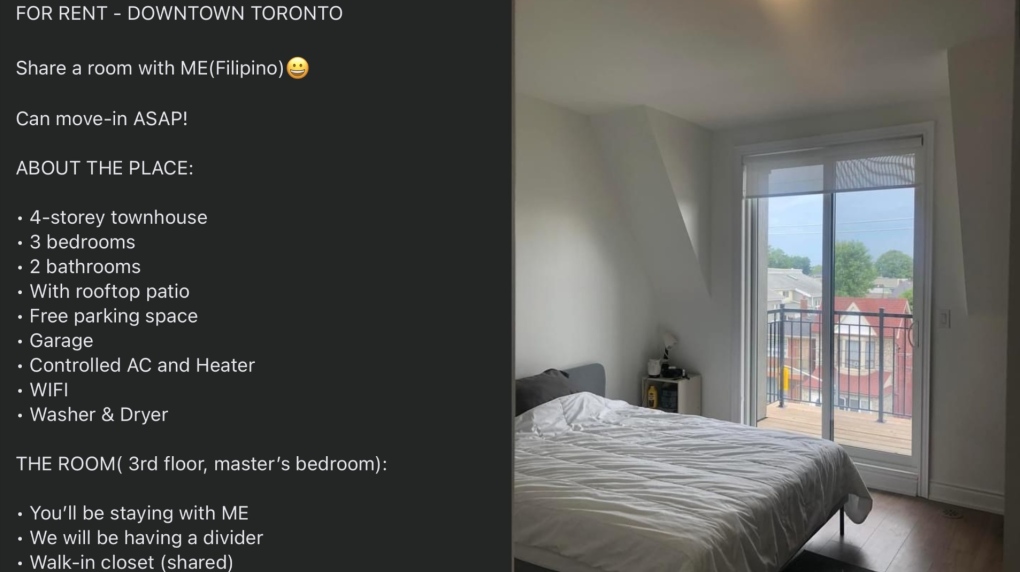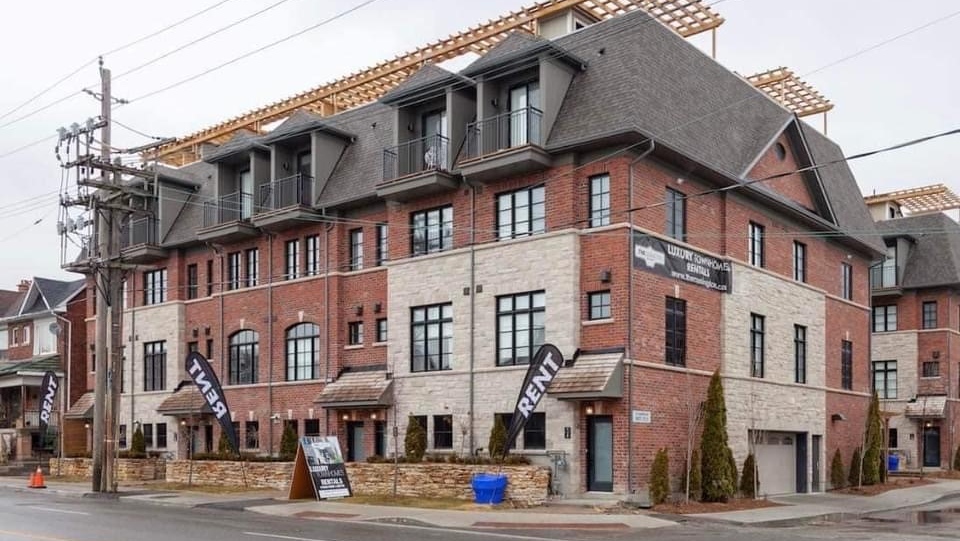This Toronto tenant had no trouble finding a roommate to share his bedroom for more than $1K each. Here's why that's a problem
A Toronto tenant seeking someone to share his bedroom for $1,050 a month was able to fill the vacancy within a matter of days – a high sign of the ongoing affordability “emergency” within Canada ’ s housing market, according to an expert in the field.
Glen Bautista advertised his room in a 4-storey red brick townhouse near Dupont and Ossington avenues for rent on Facebook last week.
“It only took like three, four days … within five days, he moved in,” Bautista said, of his new roommate.
Bautista moved into the bedroom in April with a roommate who has since moved to Alberta. They shared a walk-in closet, bathroom with two sinks, balcony, and a room with a divider to create some privacy.
“Sharing a roommate is difficult, especially since I work in the mornings, and my previous roommate worked in the restaurant, so he finishes work at 2 or 3 a.m., and I’m asleep,” Bautista said.
Before that, they lived in Scarborough — a more than hour commute to work for his roommates.
While Bautista’s full-time job as a business analyst is located in North York, he says the new house is close to his part-time job on weekends as a server and bartender.
There are added logistics to sharing a room, Bautista admits, but he said the current apartment – downtown, near a transit station and one of his jobs – is worth the compromise when compared to his previous place in Scarborough for practically the same price.
'IT’S AN EMERGENCY'
Nemoy Lewis, an assistant professor of urban and regional planning at Toronto Metropolitan University, said this situation should serve as a warning signal.
“I think what it says is it’s at a point now where it’s an emergency … It signals to me the failures of policies in foreseeing these particular issues to arise in the market,” he said.
 A Facebook post describes a shared room for rent in Toronto.It speaks to the creativity tenants have to take in unaffordable markets, Lewis said. “If folks are having to go at these lengths to find housing in the city, it begs to wonder if the current market is helping to create more income polarizing cities only the wealthy can afford to live in.”
A Facebook post describes a shared room for rent in Toronto.It speaks to the creativity tenants have to take in unaffordable markets, Lewis said. “If folks are having to go at these lengths to find housing in the city, it begs to wonder if the current market is helping to create more income polarizing cities only the wealthy can afford to live in.”
The rental market has climbed steadily in Toronto over the last two years, with little relief in sight, according to real estate research firm Urbanation’s July report. The average rent for a condo under 400 square feet in the city was $2,121 at the time.
“Rents are now being driven to new highs on interest rates hitting their highest level in 22 years, the population increasing by a record pace, near record-low unemployment, and scarce supply,” the report stated.
There is no “magic pill” to fix this, Lewis acknowledged. However, removing policies that are eroding the marketplace is a good place to start, he said.
He points to vacancy decontrol, a policy put in place more than 25 years ago that allows landlords to raise the rent of a unit without a cap if the space is vacated, in contrast to the rent control in place that presides over an occupied unit.
 A four storey townhouse near Dupont and Ossington avenues in Toronto.“What this essentially does is it incentivizes landlords to remove long standing tenants protected under rent control and in turn, rent them out to a new, more affluent tenant class,” Lewis said.
A four storey townhouse near Dupont and Ossington avenues in Toronto.“What this essentially does is it incentivizes landlords to remove long standing tenants protected under rent control and in turn, rent them out to a new, more affluent tenant class,” Lewis said.
As another instance, Lewis looked to Premier Doug Ford’s removal of rent control on new units built after Nov. 15, 2018, in an effort to boost the rental supply in the midst of soaring housing costs, which Lewis said has only “exacerbated” the affordability crisis.
“We need to think long and hard about what are the current policies that got us here in the first place and how we can turn the corner and create policies that are actually going to ensure that housing becomes a social good again in this country.”
CTVNews.ca Top Stories

LIVE UPDATES Trudeau considering his options as leader after Freeland quits cabinet, sources say
Chrystia Freeland, Canada's finance minister, said in an explosive letter published Monday morning that she will quit cabinet. Follow along for live updates.
Finance Minister Chrystia Freeland quits cabinet hours before economic update
Deputy Prime Minister and Finance Minister Chrystia Freeland has announced she's resigning from cabinet. In a letter to Prime Minister Justin Trudeau posted to social media, Freeland said this decision came after Trudeau offered her another position.
Amid Freeland resignation, Department of Finance begins embargoed reading of fall economic statement
Amid the news Finance Minister Chrystia Freeland has resigned from Prime Minister Justin Trudeau’s cabinet, the Department of Finance has begun handing out embargoed copies of the long-anticipated fall economic statement.
W5 Investigates Connecting the dots on a landlord scam: how clues revealed a prolific con artist at work
In part one of a three-part investigation, W5 correspondent Jon Woodward reveals how a convicted con artist bilked dozens of people in a landlord scam.
3 dead, others injured in shooting at private Christian school in Wisconsin
A teenage student opened fire at a private Christian school Monday morning in Wisconsin, killing a teacher and another student in the final week before Christmas break. The shooter also died, police said.
Travel risk: Which countries does Canada recommend avoiding?
Canadians planning to travel abroad over the holidays should take precautionary steps to ensure they're not unintentionally putting themselves in harm's way.
Canada Post operations to resume on Tuesday, company says
Mail is set to begin moving again on Tuesday after a month-long strike by Canada Post employees comes to a close.
Jury delivers guilty verdicts for accused in Montreal-area triple homicide trial
The accused in a triple homicide trial south of Montreal has been found guilty.
Second person facing charges in fatal boat crash in eastern Ontario on Victoria Day weekend
A second person is facing charges in connection to a boat crash that killed three people on Bobs Lake in eastern Ontario over the Victoria Day Long Weekend.


























